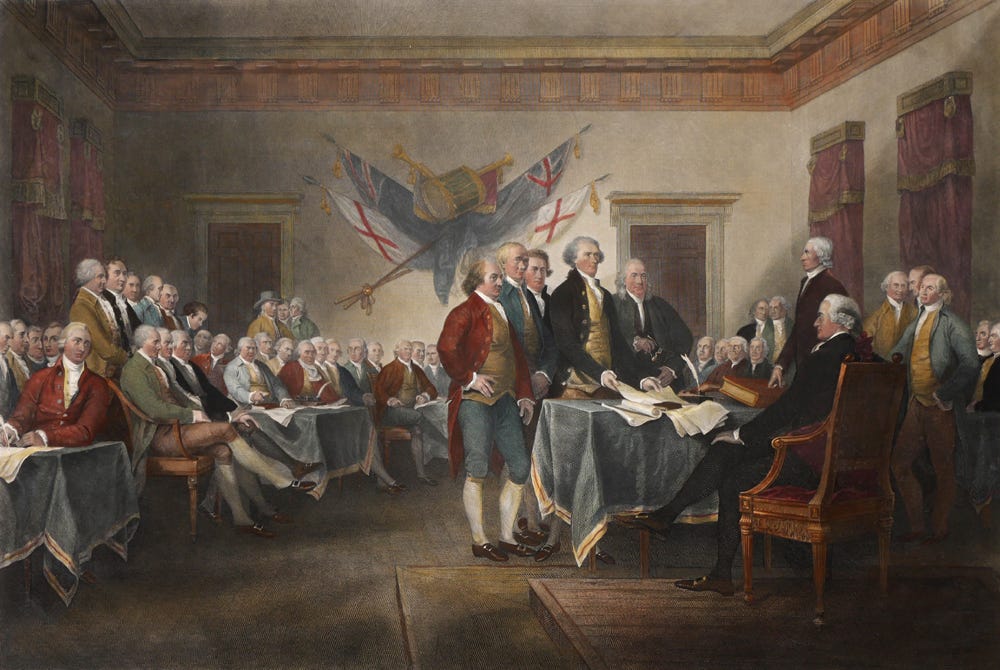Wednesday, July 4, 2018
America's Declaration Of Restoration

The revolution didn't occur in the thirteen colonies, it occurred in Parliament. The war began with Parliament's Declaratory Act 1 (1766):
“When in 1767 [sic] this modernized British Parliament, committed by now to the principle of parliamentary sovereignty unlimited and unlimitable, issued a declaration that a parliamentary majority could pass any law it saw fit, it was greeted with an out-cry of horror in the colonies. James Otis and Sam Adams in Massachusetts, Patrick Henry in Virginia and other colonial leaders along the seaboard screamed ‘Treason’ and ‘Magna Carta’! Such a doctrine, they insisted, demolished the essence of all their British ancestors had fought for, took the very savour out of that fine Anglo-Saxon liberty for which the sages and patriots of England had died.”2
The thirteen colonies had no choice but to separate themselves from the authority of Parliament, because Parliament had legalized arbitrary authority. The thirteen colonies responded to this attack on English Civilization by defending English Civilization in the colonies. What is called the American Revolution is, in fact, the American Restoration.
In practice, Parliament's arbitrary legislative behavior didn't begin in 1766 with the passage of the Declaratory Act, it had been de facto reality for several years, where Parliament targeted the thirteen colonies with various legislation, both non-revenue-based and revenue-based3 (1764 Sugar Act and Currency Act; 1765 Stamp Act and Quartering Act; etc.). But when in 1766 Parliament gave de jure establishment to Parliamentary tyranny, the die was cast, resulting in an unambiguous agreement between certain Americans that their sacred Anglo-Saxon political beliefs had been assaulted, leaving no room for compromise with Parliament.
-------------------------------------------------------------------------------------
1. The American Colonies Act 1766
2. Edwin Mims, Jr., "The Majority of the People" (New York: Modern Age Books, 1941), p. 71.
3. Culminating in another argument with Parliament: Did Parliament have the authority to tax the thirteen colonies without representation in Parliament? This issue brought into being the first Congress of the American colonies in 1765.
“When in 1767 [sic] this modernized British Parliament, committed by now to the principle of parliamentary sovereignty unlimited and unlimitable, issued a declaration that a parliamentary majority could pass any law it saw fit, it was greeted with an out-cry of horror in the colonies. James Otis and Sam Adams in Massachusetts, Patrick Henry in Virginia and other colonial leaders along the seaboard screamed ‘Treason’ and ‘Magna Carta’! Such a doctrine, they insisted, demolished the essence of all their British ancestors had fought for, took the very savour out of that fine Anglo-Saxon liberty for which the sages and patriots of England had died.”2
The thirteen colonies had no choice but to separate themselves from the authority of Parliament, because Parliament had legalized arbitrary authority. The thirteen colonies responded to this attack on English Civilization by defending English Civilization in the colonies. What is called the American Revolution is, in fact, the American Restoration.
In practice, Parliament's arbitrary legislative behavior didn't begin in 1766 with the passage of the Declaratory Act, it had been de facto reality for several years, where Parliament targeted the thirteen colonies with various legislation, both non-revenue-based and revenue-based3 (1764 Sugar Act and Currency Act; 1765 Stamp Act and Quartering Act; etc.). But when in 1766 Parliament gave de jure establishment to Parliamentary tyranny, the die was cast, resulting in an unambiguous agreement between certain Americans that their sacred Anglo-Saxon political beliefs had been assaulted, leaving no room for compromise with Parliament.
-------------------------------------------------------------------------------------
1. The American Colonies Act 1766
2. Edwin Mims, Jr., "The Majority of the People" (New York: Modern Age Books, 1941), p. 71.
3. Culminating in another argument with Parliament: Did Parliament have the authority to tax the thirteen colonies without representation in Parliament? This issue brought into being the first Congress of the American colonies in 1765.

Comments
Post a Comment